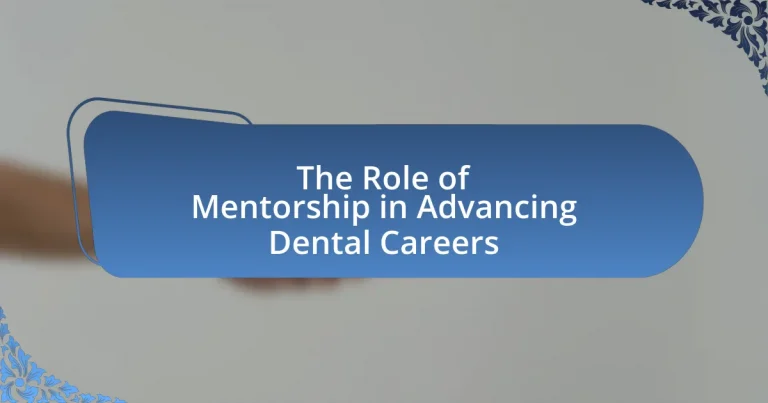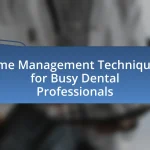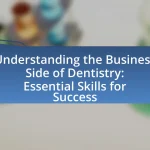The article focuses on the critical role of mentorship in advancing dental careers, emphasizing its importance in providing guidance, support, and knowledge transfer from experienced professionals to novices. It outlines how mentorship influences professional development, enhances clinical skills, and fosters networking opportunities, ultimately leading to increased job satisfaction and career advancement. Key components of effective mentorship, the evolution of mentorship relationships, and the various types of mentorship in dentistry are discussed, along with strategies for maximizing mentorship benefits and overcoming common challenges. The article also highlights the role of dental schools in fostering mentorship and the best practices for successful mentor-mentee relationships.

What is the Role of Mentorship in Advancing Dental Careers?
Mentorship plays a crucial role in advancing dental careers by providing guidance, support, and knowledge transfer from experienced professionals to less experienced individuals. This relationship fosters skill development, enhances clinical competencies, and promotes professional growth through personalized feedback and networking opportunities. Research indicates that mentorship can significantly impact career satisfaction and progression; for instance, a study published in the Journal of Dental Education found that mentees reported higher levels of confidence and career advancement compared to those without mentors. Thus, effective mentorship is essential for navigating the complexities of the dental profession and achieving long-term success.
How does mentorship influence professional development in dentistry?
Mentorship significantly influences professional development in dentistry by providing guidance, support, and knowledge transfer from experienced practitioners to less experienced individuals. This relationship fosters skill enhancement, confidence building, and networking opportunities, which are crucial for career advancement. Research indicates that mentorship can lead to improved clinical skills and increased job satisfaction among dental professionals, as evidenced by a study published in the Journal of Dental Education, which found that mentees reported higher levels of professional growth and career satisfaction compared to those without mentors.
What are the key components of effective mentorship in dental careers?
The key components of effective mentorship in dental careers include clear communication, mutual respect, goal setting, and ongoing feedback. Clear communication ensures that both mentor and mentee understand expectations and objectives, fostering a productive relationship. Mutual respect creates a supportive environment where the mentee feels valued and encouraged to share their thoughts and concerns. Goal setting provides direction and measurable outcomes for the mentorship, allowing both parties to track progress. Ongoing feedback is essential for continuous improvement, as it helps the mentee refine their skills and knowledge based on constructive criticism and guidance. These components are supported by studies indicating that structured mentorship programs significantly enhance professional development and job satisfaction among dental professionals.
How do mentorship relationships evolve over time in the dental field?
Mentorship relationships in the dental field evolve through distinct phases, beginning with initial guidance and progressing to collaborative partnerships. Initially, a mentor provides foundational knowledge and skills to a mentee, often during dental school or early career stages. As the mentee gains experience, the relationship shifts towards mutual learning, where both mentor and mentee share insights and challenges. Over time, this relationship can develop into a professional network, facilitating opportunities for career advancement and collaboration on research or community projects. Research indicates that effective mentorship can lead to increased job satisfaction and professional growth, highlighting the importance of these evolving relationships in the dental profession.
Why is mentorship important for dental professionals?
Mentorship is important for dental professionals because it facilitates skill development, enhances clinical knowledge, and fosters professional growth. Experienced mentors provide guidance on complex procedures, helping mentees navigate challenges and improve their technical abilities. Research indicates that mentorship in healthcare settings, including dentistry, leads to increased job satisfaction and retention rates, as noted in a study published in the Journal of Dental Education, which found that 70% of dental students who had mentors reported feeling more prepared for their careers. Additionally, mentorship encourages networking opportunities, allowing dental professionals to build valuable connections within the industry, which can lead to career advancement and collaborative opportunities.
What benefits do mentees gain from mentorship in dentistry?
Mentees in dentistry gain several benefits from mentorship, including enhanced clinical skills, professional networking opportunities, and increased confidence in their practice. Mentorship provides mentees with direct access to experienced professionals who can offer guidance on complex clinical cases, thereby improving their technical abilities. Additionally, mentorship fosters connections within the dental community, which can lead to job opportunities and collaborations. Research indicates that mentorship significantly boosts mentees’ self-efficacy, as they receive constructive feedback and encouragement, ultimately leading to a more successful career trajectory in dentistry.
How does mentorship impact career advancement for dental professionals?
Mentorship significantly enhances career advancement for dental professionals by providing guidance, networking opportunities, and skill development. Research indicates that dental professionals with mentors are more likely to achieve leadership positions and higher job satisfaction. A study published in the Journal of Dental Education found that 70% of mentees reported improved career trajectories due to mentorship, highlighting its role in fostering professional growth and expanding industry connections.

What types of mentorship exist in the dental profession?
In the dental profession, there are several types of mentorship, including formal mentorship, informal mentorship, peer mentorship, and group mentorship. Formal mentorship typically involves structured programs where experienced dentists guide less experienced practitioners, often through established organizations or institutions. Informal mentorship occurs organically, where relationships develop naturally between colleagues without a formal structure. Peer mentorship involves individuals at similar career stages supporting each other, fostering mutual growth and learning. Group mentorship consists of a mentor guiding multiple mentees simultaneously, allowing for diverse perspectives and shared learning experiences. Each type plays a crucial role in professional development and skill enhancement within the dental field.
How do formal and informal mentorship differ in dental careers?
Formal mentorship in dental careers is structured and often involves a designated mentor-mentee relationship with specific goals and expectations, while informal mentorship is more spontaneous and can occur through casual interactions without a defined framework. Formal mentorship programs typically include organized training sessions, regular meetings, and measurable outcomes, which can enhance professional development and networking opportunities. In contrast, informal mentorship relies on personal connections and experiences shared in less structured environments, such as during dental school or at professional events, allowing for organic learning and support. Research indicates that formal mentorship can lead to higher career satisfaction and advancement, as evidenced by a study published in the Journal of Dental Education, which found that mentees in formal programs reported greater confidence and skill development compared to those relying solely on informal mentorship.
What are the advantages of formal mentorship programs in dentistry?
Formal mentorship programs in dentistry provide structured guidance that enhances professional development and skill acquisition. These programs facilitate knowledge transfer from experienced practitioners to novices, improving clinical competencies and decision-making skills. Research indicates that mentorship can lead to increased job satisfaction and reduced burnout among dental professionals, as evidenced by a study published in the Journal of Dental Education, which found that mentees reported higher levels of confidence and career satisfaction. Additionally, formal mentorship fosters networking opportunities, enabling mentees to build professional relationships that can lead to career advancement and collaboration in the field.
How can informal mentorship be effectively utilized in dental practice?
Informal mentorship can be effectively utilized in dental practice by fostering open communication and collaboration between experienced practitioners and newer dentists. This approach allows for the sharing of practical knowledge, clinical skills, and professional experiences in a less structured environment, which can enhance learning and confidence. Research indicates that informal mentorship leads to improved job satisfaction and retention rates among dental professionals, as it creates a supportive network that encourages continuous professional development. For instance, a study published in the Journal of Dental Education found that mentorship relationships significantly contributed to the career advancement of dental graduates, highlighting the importance of informal guidance in shaping successful dental careers.
What role do dental schools play in fostering mentorship?
Dental schools play a crucial role in fostering mentorship by providing structured programs that connect students with experienced professionals in the field. These mentorship programs facilitate knowledge transfer, skill development, and professional networking, which are essential for career advancement in dentistry. Research indicates that mentorship in dental education enhances clinical skills and boosts confidence among students, leading to improved patient care outcomes. For instance, a study published in the Journal of Dental Education found that students who participated in mentorship programs reported higher satisfaction and engagement levels, reinforcing the importance of mentorship in shaping future dental professionals.
How can dental schools enhance mentorship opportunities for students?
Dental schools can enhance mentorship opportunities for students by implementing structured mentorship programs that pair students with experienced faculty and alumni. These programs can facilitate regular one-on-one meetings, allowing students to receive personalized guidance and support tailored to their career aspirations. Research indicates that structured mentorship significantly improves student satisfaction and professional development, as evidenced by a study published in the Journal of Dental Education, which found that 85% of students reported increased confidence in their clinical skills due to mentorship. Additionally, incorporating mentorship training for faculty can ensure that mentors are equipped with the skills necessary to effectively guide students, further enhancing the overall mentorship experience.
What initiatives can be implemented to promote mentorship in dental education?
To promote mentorship in dental education, institutions can implement structured mentorship programs that pair experienced dental professionals with students. These programs can include regular one-on-one meetings, workshops, and networking events designed to facilitate knowledge sharing and professional development. Research indicates that mentorship significantly enhances student engagement and career readiness, as evidenced by a study published in the Journal of Dental Education, which found that 85% of dental students reported improved confidence and skills through mentorship initiatives. Additionally, integrating mentorship into the curriculum can ensure that students receive consistent guidance throughout their education, fostering a culture of support and collaboration within dental schools.

How can dental professionals maximize the benefits of mentorship?
Dental professionals can maximize the benefits of mentorship by actively engaging in structured mentorship programs that facilitate knowledge sharing and skill development. By participating in these programs, dental professionals can gain insights from experienced mentors, which can enhance their clinical skills and professional growth. Research indicates that mentorship in healthcare settings leads to improved job satisfaction and career advancement, as evidenced by a study published in the Journal of Dental Education, which found that mentees reported a 30% increase in confidence and competence in their practice after mentorship engagement.
What strategies can mentees use to find the right mentor?
Mentees can use targeted networking, research, and clear goal-setting to find the right mentor. Targeted networking involves attending industry events, joining professional organizations, and utilizing social media platforms like LinkedIn to connect with experienced professionals in the dental field. Researching potential mentors includes reviewing their backgrounds, expertise, and contributions to the field, ensuring alignment with the mentee’s career aspirations. Clear goal-setting helps mentees articulate what they seek from a mentorship relationship, making it easier to identify mentors who can provide relevant guidance and support. These strategies are effective as they leverage existing professional networks and resources, increasing the likelihood of finding a mentor who is well-suited to the mentee’s specific needs and goals in advancing their dental career.
How can mentees effectively communicate their goals to mentors?
Mentees can effectively communicate their goals to mentors by clearly articulating their objectives and expectations during initial discussions. This involves preparing a concise statement that outlines specific career aspirations, desired skills, and timelines for achievement. Research indicates that goal clarity enhances mentor-mentee relationships, as it allows mentors to tailor their guidance and support effectively. For instance, a study published in the Journal of Dental Education highlights that structured communication about goals leads to more productive mentorship outcomes, emphasizing the importance of setting measurable and realistic objectives.
What steps can mentees take to maintain a productive mentorship relationship?
Mentees can maintain a productive mentorship relationship by setting clear goals and expectations with their mentors. Establishing specific objectives allows both parties to align their efforts and measure progress effectively. Regular communication is essential; mentees should schedule consistent check-ins to discuss challenges and successes, fostering an open dialogue that enhances the relationship. Additionally, mentees should actively seek feedback and be receptive to constructive criticism, which can lead to personal and professional growth. Engaging in mutual respect and appreciation for the mentor’s time and expertise further strengthens the bond. Research indicates that effective mentorship relationships often lead to improved career outcomes, highlighting the importance of these steps in the context of advancing dental careers.
What are common challenges in mentorship within the dental field?
Common challenges in mentorship within the dental field include time constraints, mismatched expectations, and varying levels of commitment from both mentors and mentees. Time constraints often arise due to the demanding schedules of dental professionals, making it difficult to dedicate sufficient time for mentorship activities. Mismatched expectations can lead to misunderstandings about the goals and outcomes of the mentorship relationship, which may hinder effective communication and progress. Additionally, varying levels of commitment can result in an imbalance where one party is more invested than the other, ultimately affecting the quality and effectiveness of the mentorship experience. These challenges can impede the development of meaningful mentor-mentee relationships, which are crucial for advancing careers in dentistry.
How can mismatched expectations affect mentorship outcomes?
Mismatched expectations can significantly hinder mentorship outcomes by creating misunderstandings and dissatisfaction between mentors and mentees. When mentors and mentees have differing views on goals, communication styles, or the level of commitment required, it can lead to frustration and disengagement. Research indicates that clear alignment of expectations is crucial; for instance, a study published in the Journal of Dental Education found that mentorship relationships with clearly defined objectives resulted in higher satisfaction and better career advancement for mentees. Therefore, establishing mutual expectations at the outset is essential for effective mentorship in dental careers.
What strategies can be employed to overcome challenges in mentorship?
To overcome challenges in mentorship, establishing clear communication and setting mutual expectations are essential strategies. Clear communication fosters understanding and trust between mentors and mentees, which is crucial for addressing any issues that arise. Setting mutual expectations ensures that both parties are aligned on goals, responsibilities, and desired outcomes, reducing the likelihood of misunderstandings. Research indicates that effective mentorship relationships, characterized by open dialogue and defined objectives, lead to higher satisfaction and better career advancement outcomes in fields such as dentistry. For instance, a study published in the Journal of Dental Education found that structured mentorship programs significantly improved mentee confidence and career progression, highlighting the importance of these strategies in overcoming mentorship challenges.
What best practices should dental professionals follow for successful mentorship?
Dental professionals should establish clear communication and set defined goals for successful mentorship. Effective mentorship relies on open dialogue, allowing mentees to express their needs and concerns while mentors provide constructive feedback. Additionally, mentors should create a structured plan that outlines specific objectives and milestones, facilitating measurable progress. Research indicates that structured mentorship programs lead to higher satisfaction and better career outcomes for mentees, as evidenced by a study published in the Journal of Dental Education, which found that 75% of participants reported improved skills and confidence through guided mentorship.
How can mentors provide constructive feedback to their mentees?
Mentors can provide constructive feedback to their mentees by delivering specific, actionable insights that focus on the mentee’s strengths and areas for improvement. This approach involves using clear examples from the mentee’s work to illustrate points, ensuring that feedback is relevant and applicable. Research indicates that effective feedback is most beneficial when it is timely and delivered in a supportive manner, fostering an environment where mentees feel comfortable discussing their challenges. For instance, a study published in the Journal of Dental Education highlights that structured feedback sessions significantly enhance the learning experience for dental students, leading to improved clinical skills and confidence.
What are effective ways to measure the success of mentorship in dental careers?
Effective ways to measure the success of mentorship in dental careers include tracking mentee career progression, assessing skill development, and gathering feedback through surveys. Career progression can be quantified by monitoring promotions, job placements, or advancements in clinical responsibilities among mentees, which indicates the effectiveness of mentorship. Skill development can be evaluated through pre- and post-mentorship assessments, demonstrating improvements in clinical competencies or patient management. Additionally, surveys can collect qualitative and quantitative feedback from both mentors and mentees regarding their experiences, satisfaction levels, and perceived value of the mentorship relationship, providing insights into its overall impact on professional growth.


